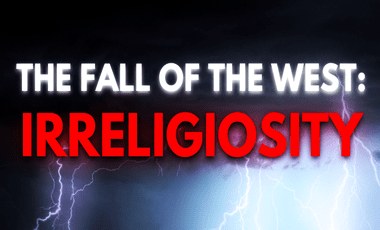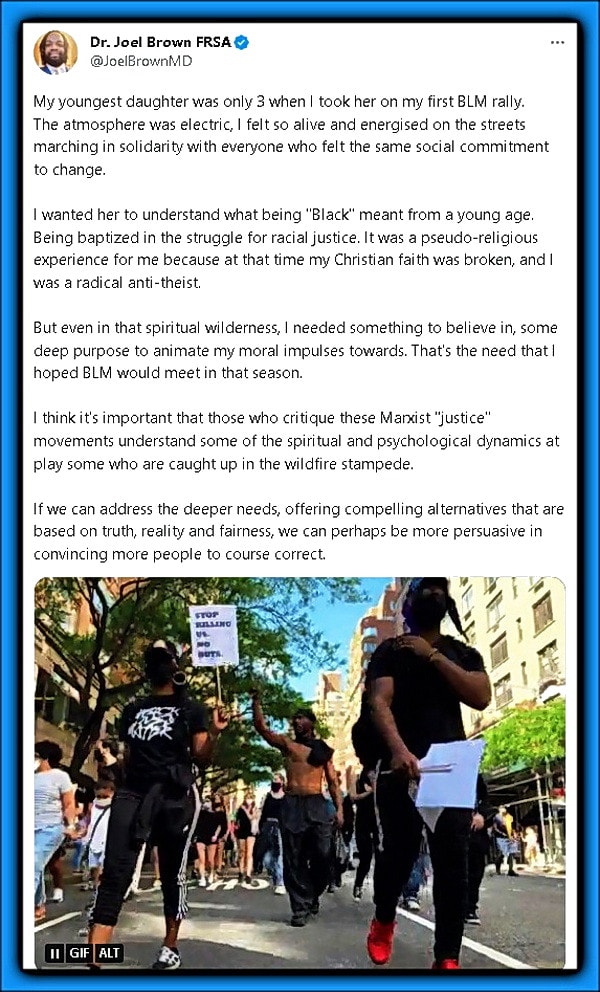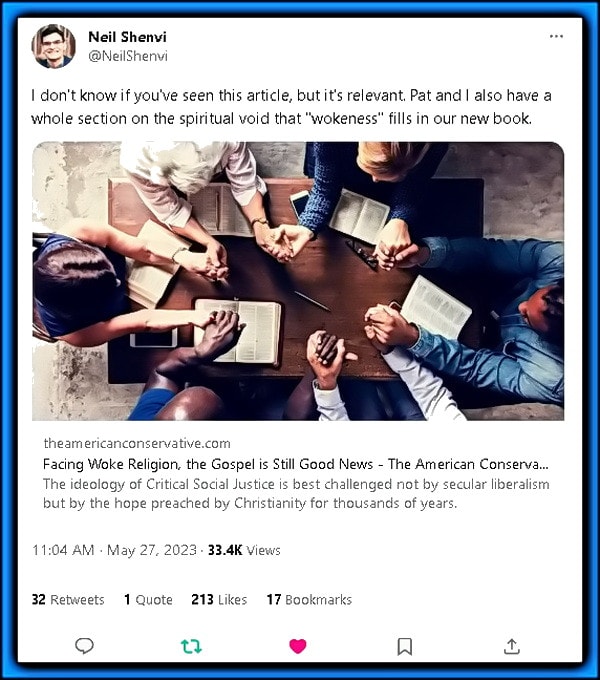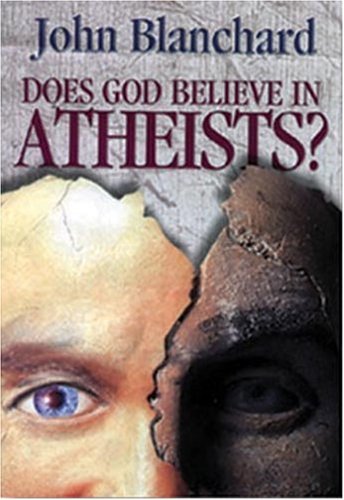I came across this Tweet and I loved the self introspection of the spiritual “feeling” the Left offers in their myriad of social movements that create a false sense of unified purpose.
This was Neil Shenvi’s response that led me to a co-authored article that is well worth the read:
Here are some excerpts, but the entire article is worth your attention — and, if you are a prodigious reader, I suggest marrying it with this book [chapter] chapter (HERE) from Melanie Philipps, book: “THE WORLD TURNED UPSIDE DOWN: THE GLOBAL BATTLE OVER GOD, TRUTH, AND POWER.”
The last few years have witnessed a great revival in the United States, as people have gathered to hear a message of sin and repentance proclaimed by spiritual leaders like Robin DiAngelo and Ibram X.Kendi. While the antiracist, antisexist, anti-oppressive message of the Great Awokening is allegedly secular rather than religious, its promises of equity, diversity, absolution, and inclusion have captured the imaginations and allegiances of everyone from scholars, to H.R. administrators, to entertainers, to mainstream journalists.
As many cultural commentators have suggested, we are witnessing the emergence of a new, secular religion, which views all reality through the lens of oppression, power dynamics, and social justice. But many people are also noticing a dark side. Last summer, the Smithsonian Institute released an infographic describing “rational, linear thinking” and “cause-and-effect relationships” as attributes of “whiteness.” Public school trainings accuse educators of the “spirit murdering of black and brown children,” and the Brighton and Sussex University Hospitals announced a “gender-inclusive language” policy that replaced the word “breastfeeding” with “chestfeeding.”
Worried by these developments, we join with classical liberals, moderates, and conservatives to oppose the growing illiberalism we’re seeing in our culture. But while secular liberalism is in many respects a procedural set of principles (with an assumption of moral authority) for settling disputes through open dialogue and the rule of law, the ideology of the moment is a grand metanarrative about reality. Trying to oppose an epic metanarrative by appealing to abstract principles may be a fool’s errand. As Christians, we believe this ideology is best challenged not by the secularism from which it emerged, but by an older vision—the one preached by Christianity for thousands of years.
[….]
Second, Christianity knows that we’re all seeking moral justification, whether we explain it with religious or non-religious language. In other words, all of us are seeking to be considered “righteous,” “good,” and “worthy.” While many accusations of performative “virtue signaling” are, no doubt, accurate, some people actually believe what they are saying. When they loudly lament their whiteness, abase themselves for the smallest infractions (microaggressions), and promise to “do better,” they are motivated by the same drive that led Medieval peasants to wear hair shirts, kiss cathedral steps, and buy indulgences.
Christianity doesn’t scoff at this impulse, but redirects it. Our deep, human urge to be justified, to be declared righteous, can ultimately only be met by God’s forgiveness. It won’t be achieved through a never-ending cycle of grievance and absolution.
[….]
The unremitting bitterness and mercilessness of cancel culture flows out of this ideology that draws a sharp line between the bad people and the good people. In contrast, Christianity draws a line between the bad people (all of us) and Jesus. Our hope is not in that we have lived up to God’s righteousness, but in that Jesus did so on our behalf, in his life, death, and resurrection. Thus, every Christian has reason to be overflowing with gentleness and grace: the one who has been shown mercy, shows mercy.
Christians understand C.S. Lewis’s warning that “spiritual nature, like bodily nature, will be served; deny it food and it will gobble poison.” Hence, we believe that the true, Christian story of creation, fall, redemption, and restoration in the gospel of Jesus Christ is the most effective and complete way to dislodge the mythos of critical social justice. But for those who believe that no such transcendent story exists, fighting wokeness will be an uphill battle.
Here is their forthcoming book: CRITICAL DILEMMA: THE RISE OF CRITICAL THEORIES AND SOCIAL JUSTICE IDEOLOGY―IMPLICATIONS FOR THE CHURCH AND SOCIETY
More via PRAGER:
- Judaism and Christianity hold that people are not basically good. Leftism holds that people are basically good. Therefore, Judaism and Christianity believe evil comes from human nature, and leftism believes evil comes from capitalism, religion, the nation-state (i.e. nationalism), corporations, the patriarchy and virtually every other traditional value.
- Judaism and Christianity hold that utopia on Earth is impossible — it will only come in God’s good time as a Messianic age or in the afterlife. Leftism holds that utopia is to be created here on Earth — and as soon as possible. That is why leftists find America so contemptible. They do not compare it to other nations but to a utopian ideal — a society with no inequality, no racism, no differences between the sexes (indeed, no sexes) and no greed in which everything important is obtained free.
- Judaism and Christianity believe God and the Bible are to instruct us on how to live a good life and how the heart is the last place to look for moral guidance. Leftists have contempt for anyone who is guided by the Bible and its God, and substitute the heart and feelings for divine instruction.
Now for some past posts/uploads of mine… in full….
A NEW RELIGION
This is a great article via the WALL STREET JOURNAL. I clipped the base of the article as it might not be viewable at WSJ’s website. A great and insightful read (h-t to Dennis Prager):
When a mob at Vermont’s Middlebury College shut down a speech by social scientist Charles Murray a few weeks ago, most of us saw it as another instance of campus illiberalism. Jonathan Haidt saw something more—a ritual carried out by adherents of what he calls a “new religion,” an auto-da-fé against a heretic for a violation of orthodoxy.
“The great majority of college students want to learn. They’re perfectly reasonable, and they’re uncomfortable with a lot of what’s going on,” Mr. Haidt, a psychologist and professor of ethical leadership at New York University’s Stern School of Business, tells me during a recent visit to his office. “But on each campus there are some true believers who have reoriented their lives around the fight against evil.”
THESE BELIEVERS ARE TRANSFORMING THE CAMPUS FROM A CITADEL OF INTELLECTUAL FREEDOM INTO A HOLY SPACE—WHERE WHITE PRIVILEGE HAS REPLACED ORIGINAL SIN, THE TRANSGRESSIONS OF CLASS AND RACE AND GENDER ARE CONFESSED NOT TO PRIESTS BUT TO “THE COMMUNITY,” VICTIM GROUPS ARE WORSHIPED LIKE GODS, AND THE SINNED-AGAINST ARE SUPPLICATED WITH “SAFE SPACES” AND “TRIGGER WARNINGS.”
The fundamentalists may be few, Mr. Haidt says, but they are “very intimidating” since they wield the threat of public shame. On some campuses, “they’ve been given the heckler’s veto, and are often granted it by an administration who won’t stand up to them either.”
ALL THIS HAS BECOME SOMETHING OF A PREOCCUPATION FOR THE 53-YEAR-OLD MR. HAIDT. A LONGTIME LIBERAL—HE RAN A GUN-CONTROL GROUP AS AN UNDERGRADUATE AT YALE—HE ADMITS HE “HAD NEVER ENCOUNTERED CONSERVATIVE IDEAS” UNTIL HIS MID-40S.
[…..]
“What we’re beginning to see now at Berkeley and at Middlebury hints that this [campus] religion has the potential to turn violent,” Mr. Haidt says. “The attack on the professor at Middlebury really frightened people,” he adds, referring to political scientist Allison Stanger, who wound up in a neck brace after protesters assaulted her as she left the venue.
The Berkeley episode Mr. Haidt mentions illustrates the Orwellian aspect of campus orthodoxy. A scheduled February appearance by right-wing provocateur Milo Yiannopoulos prompted masked agitators to throw Molotov cocktails, smash windows, hurl rocks at police, and ultimately cause $100,000 worth of damage. The student newspaper ran an op-ed justifying the rioting under the headline “Violence helped ensure safety of students.” Read that twice.
Mr. Haidt can explain. Students like the op-ed author “are armed with a set of concepts and words that do not mean what you think they mean,” he says. “People older than 30 think that ‘violence’ generally involves some sort of physical threat or harm. But as students are using the word today, ‘violence’ is words that have a negative effect on members of the sacred victim groups. And so even silence can be violence.” It follows that if offensive speech is “violence,” then actual violence can be a form of self-defense.
Down the hall from Mr. Haidt’s office, I noticed a poster advertising a “bias response hotline” students can call “to report an experience of bias, discrimination or harassment.” I joke that NYU seems to have its own version of the morality police in Islamic countries like Saudi Arabia. “It’s like East Germany,” Mr. Haidt replies—with students, at least some of them, playing the part of the Stasi.
How did we get here, and what can be done? On the first question, Mr. Haidt points to a braided set of causes. There’s the rise in political polarization, which is related to the relatively recent “political purification of the universities.” While the academy has leaned left since at least the 1920s, Mr. Haidt says “it was always just a lean.” Beginning in the early 1990s, as the professors of the Greatest Generation retired, it became a full-on tilt.
“Now there are no more conservative voices on the faculty or administration,” he says, exaggerating only a little. Heterodox Academy cites research showing that the ratio of left to right professors in 1995 was 2 to 1. Now it is 5 to 1.
The left, meanwhile, has undergone an ideological transformation. A generation ago, social justice was understood as equality of treatment and opportunity: “If gay people don’t have to right to marry and you organize a protest to apply pressure to get them that right, that’s justice,” Mr. Haidt says. “If black people are getting discriminated against in hiring and you fight that, that’s justice.”
Today justice means equal outcomes. “There are two ideas now in the academic left that weren’t there 10 years ago,” he says. “One is that everyone is racist because of unconscious bias, and the other is that everything is racist because of systemic racism.” That makes justice impossible to achieve: “When you cross that line into insisting if there’s not equal outcomes then some people and some institutions and some systems are racist, sexist, then you’re setting yourself up for eternal conflict and injustice.”
Perhaps most troubling, Mr. Haidt cites the new protectiveness in child-rearing over the past few decades. Historically, American children were left to their own devices and had to learn to deal with bullies. Today’s parents, out of compassion, handle it for them. “By the time students get to college they have much, much less experience with unpleasant social encounters, or even being insulted, excluded or marginalized,” Mr. Haidt says. “They expect there will be some adult, some authority, to rectify things.”
Combine that with the universities’ shift to a “customer is always right” mind-set. Add in social media. Suddenly it’s “very, very easy to bring mobs together,” Mr. Haidt says, and make “people very afraid to stand out or stand up for what they think is right.” Students and professors know, he adds, that “if you step out of line at all, you will be called a racist, sexist or homophobe. In fact it’s gotten so bad out there that there’s a new term—‘ophobophobia,’ which is the fear of being called x-ophobic.”
That fear runs deep—including in Mr. Haidt. When I ask him about how political homogeneity on campus informs the understanding of so-called rape culture, he clams up: “I can’t talk about that.” The topic of sexual assault—along with Islam—is too sensitive.
It’s a painfully ironic answer from a man dedicating his career to free thought and speech. But choosing his battles doesn’t mean Mr. Haidt is unwilling to fight. And he’s finding allies across the political spectrum.
[….]
Following the Middlebury incident, the unlikely duo of Democratic Socialist Cornel West and conservative Robert P. George published a statement denouncing “campus illiberalism” and calling for “truth seeking, democracy and freedom of thought and expression.” More than 2,500 scholars and other intellectuals have signed it. At Northwestern the student government became the first in the country to pass a resolution calling for academic freedom and viewpoint diversity.
[….]
He offers this real-world example: “I think that the ‘deplorables’ comment could well have changed the course of human history.”
the Religion of the Left (David Horowitz)




